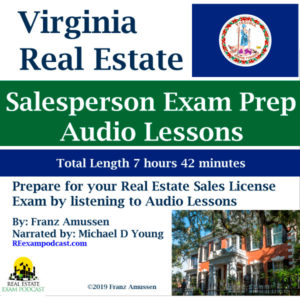Podcast: Play in new window | Download (Duration: 23:38 — 10.9MB)
Subscribe: Apple Podcasts | Email | RSS | More

Virginia Real Estate Salesperson Exam Lesson 3
This is the third of five sample lessons that we will be sharing with you which will help you prepare for the Virginia real estate salesperson exam.
These Virginia real estate salesperson exam lessons are meant to be a supplement and not a substitute for classroom learning or other requirements of the Virginia real estate department for licensure.
Lesson 3: Owning a Home
Real estate professionals help people navigate complex laws, zoning ordnances and other regulations to find the kind of home they want and need.
Types of Housing
- Condos
- Single-family homes (most common)
- Apartments (low-rise, mid-rise, and high-rise)
- Cooperatives
- Mobile Homes
- Modular Homes
- Time-Shares (Fee simple, Right-to-Use, Leasehold)
- Planned Unit Development (PUD)
- Retirement communities
Things to Consider in Home Ownership
- Interest rate
- Length of the loan
- Down payment requirements
Types of Mortgage Loans
- FHA Loans (Federal Housing Administration)
- VA Loans (Veterans Affairs)
- HUD Loans (Housing Urban Development)
Home Taxing Terms
- Appreciation vs. Depreciation
- Capital gains vs. capital losses
Real Estate taxes can be assessed by various levels of government. They are typically based on the appraised value of the property.
Tax Advantages for Home Owners
- Homeowners can deduct mortgage interest
- You can get a tax break for depreciation on your property
- Capital gains are not taxes unless they are over a certain amount
Virginia Tax Law
- Local taxing authorities determine the value of real estate and then apply the local tax code to it.
- Certain types of property are tax exempt, such as churches, burying grounds, public libraries and learning institutions. Public parks and non-profit organizations are also exempt.
If you are looking for other Real Estate audio Lessons we have them for:
